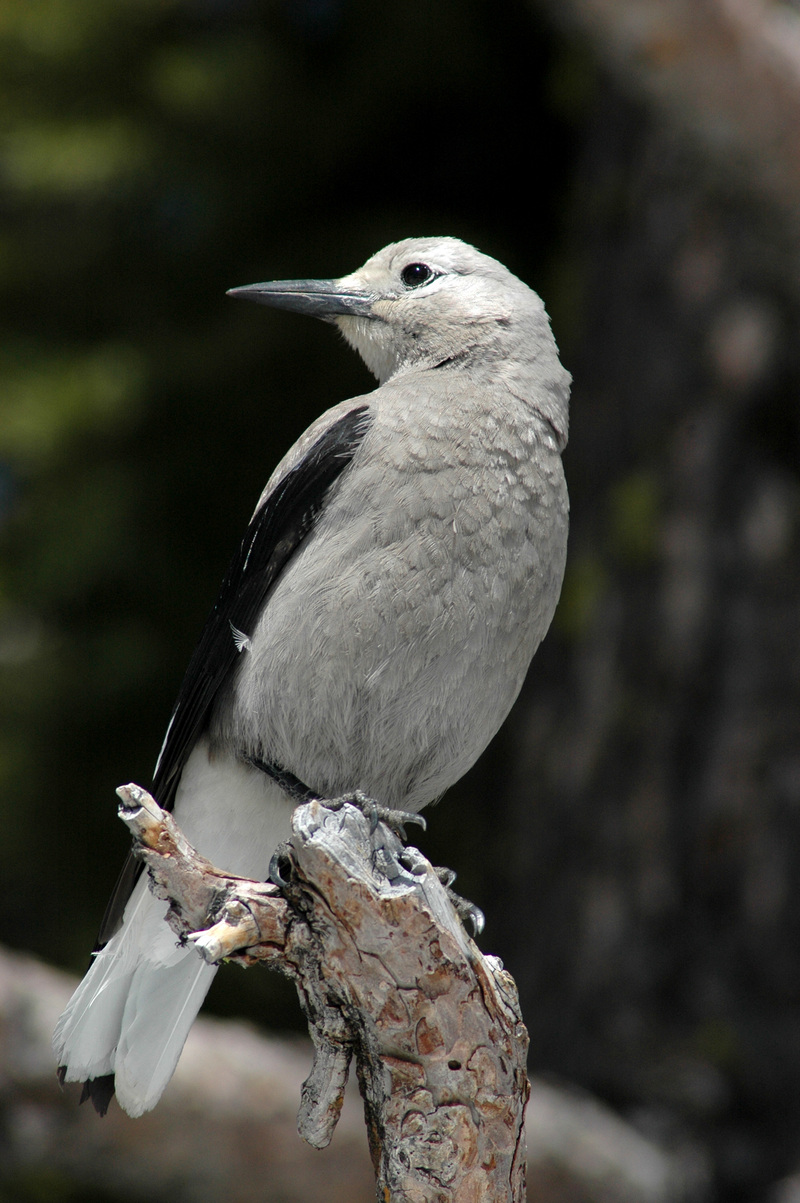Clark's Nutcracker
From Wikipedia, the free encyclopedia
[Photo] Clark's Nutcracker perched on a branch. Photograph taken by Michael Sulis, April 30th, 2006 at Crater Lake, Oregon.
The Clark's Nutcracker (Nucifraga columbiana), is a large passerine bird, in the family Corvidae. It is slightly smaller than its Eurasian relative Spotted Nutcracker (N. caryocatactes). It is ashy-grey all over except for the black-and-white wings and central tail feathers (the outer ones are white). The bill, legs and feet are also black.
It occurs in western North America from British Columbia and western Alberta in the north to Baja California and western New Mexico in the south. There is also a small isolated population on the peak of Cerro Potos?? (3,700 m) in Nuevo Le??n, northeast Mexico. It is mainly found in mountains at altitudes of 900-3900 m in pine forest. Outside the breeding season, it may wander extensively to lower altitudes and also further east as far as Illinois (and exceptionally, Pennsylvania), particularly following any cone crop failure in its normal areas.
The most important food resources for this species are the seeds of Pines (Pinus sp.), principally the two cold-climate (high altitude) species of white pine (Pinus subgenus Strobus) with large seeds P. albicaulis and P. flexilis, but also using other high-altitude species like P. balfouriana, P. longaeva and P. monticola. During eruptions to lower altitudes, it also extensively uses the seeds of pinyon pines. The isolated Cerro Potos?? population is strongly associated with the local endemic Potosi Pinyon Pinus culminicola.
Surplus Pine seed is stored, usually in the ground for later consumption, in numerous caches of 5-10 seeds each spread over a wide area (up to 20 × 20 km). The birds regularly store more than their actual needs (up to 100,000 seeds per bird!) as an insurance against seed theft by other animals (squirrels, etc.); this surplus seed is able to germinate and grow into new trees, thus the bird is perpetuating its own habitat. Closely tied in with this storage behaviour is the bird's remarkable long-term spatial memory; they are able to relocate caches of seeds unerringly, even six months later, and when the cache sites are buried under up to a metre (3 feet) of snow.
The diet also includes a wide range of insect prey, berries and other fruits, small mammals and occasionally flesh from carcasses. Eggs and nestlings also taken and peanuts and suet have become a favorite at bird tables. Food is taken both on the ground and in trees (where it is very agile among the branches) where cones are held between one or both feet and hacked open with the strong bill. Rotten logs are hacked into for large beetle grubs and animal dung is flipped over in search of insects.
Nesting is usually in pines or other conifers, not always on the sunny side and always very early in the season. Wind protection seems to be of more value for nest placement. There are normally 3 eggs laid, rarely more or less than this. Incubation is usually 16-18 days and usually fledged by around the 22nd day. The young follow their parents around for several months after fledging, in order to learn the complex seed storage behaviour.
The voice is extremely varied and many sounds are made but the most frequent is usually described as khaaa-khaaa-khaaa or khraa-khraa-khraa, usually in a series of three.
This bird is named after the explorer William Clark. Other names include Clark's Crow and Woodpecker Crow.
http://en.wikipedia.org/wiki/Clark's_Nutcracker
| The text in this page is based on the copyrighted Wikipedia article shown in above URL. It is used under the GNU Free Documentation License. You may redistribute it, verbatim or modified, providing that you comply with the terms of the GFDL. |
|

